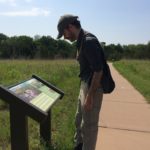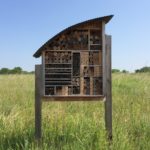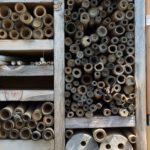Pollinators may also eat many pest insects, and we have come to recognize that conservation of pollinators is tied to healthy ecosystems, including in agriculture and in control of pests (e.g., mosquitoes). We can take several steps to promote a rich array of pollinators in any habitat, from wild patches with suitable native plants for food, nursery and shelter to reduced pesticide-use. A further step is to provide man-made housing such as bat, bird and bee houses.
At the KU Field Station, undergraduate Eric Becker and I visited a beautiful and grand bee hotel. But a more discrete one for the home garden can be constructed (instructions below) or purchased (several designs at Amazon.com). Being an activist for pollinators at home will definitely promote pollinator diversity at local, regional and global scales!



Read more: http://www.fs.fed.us/wildflowers/pollinators/
Build your own bee house:
1. http://www.nwf.org/Garden-For-Wildlife/Young/Build-a-Bee-House.aspx
2. http://www.foxleas.com/make-a-bee-hotel.asp
Support organizations promoting pollinator conservation:
http://www.pollinator.org/ http://www.monarchwatch.org/
Comments are closed.